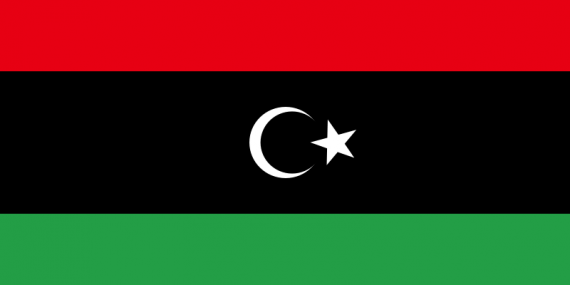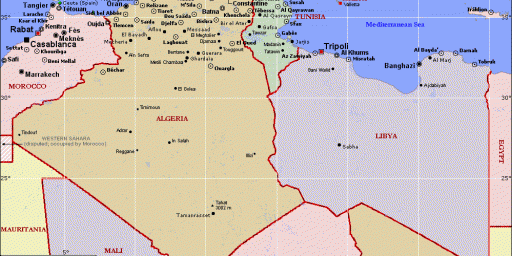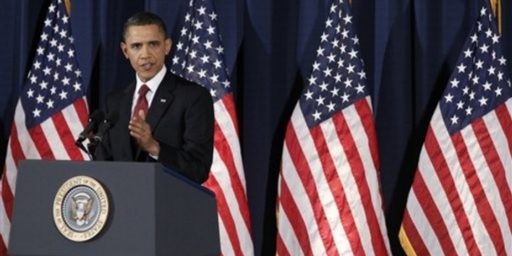What Should The U.S. Do About Libya? Most Americans Say Nothing
Calls are coming from both sides of the aisle for the U.S. to do "something" about the situation in Libya. It would be better if we didn't get involved.
As the crisis continues to unfold in Libya, the voices of those criticizing the Obama Administration for not taking action are getting louder:
(Reuters) – Pressure mounted on the White House on Tuesday to intervene to stop Muammar Gaddafi's bloody crackdown on democracy protests as a lawmaker close to President Barack Obama urged oil firms to halt work in Libya.
The administration faced calls for military actions ranging from bombing Libyan airfields and imposing no-fly-zones, and criticism of Obama's silence on the violence in which hundreds have died.
Senator John Kerry, the influential chairman of the Senate Foreign Relations Committee, called on the Obama administration to consider reimposing tough sanctions on Libya.
"World leaders must together put Colonel Gaddafi on notice that his cowardly actions will have consequences," Kerry said.
Kerry's outspoken Republican counterpart in the House of Representatives, Ileana Ros-Lehtinen, said the United States and other nations should impose economic sanctions, including freezing assets and issuing a travel ban on senior Libyan government officials and their families.
The Washington Post editorialized yesterday that President Obama needs to be more forceful in his denunciations of the Gaddafi refime:
The United States has used its influence to restrain such violence by allied governments, most recently in Bahrain. Now it should join with its allies in demanding that the Gaddafi regime be held accountable for its crimes.
The first way to do that is a public call for regime change. Secretary of State Hillary Rodham Clinton said Monday that it was "time to stop this unacceptable bloodshed" in Libya; European leaders made similar statements. But the regime's actions demand much more forceful action, including an immediate downgrading of relations and the raising of Libya's case before the U.N. Security Council. The United States and the European Union should make clear that if the regime survives through violence, it will be subject to far-reaching sanctions, including on its oil industry.
More concertely, several commentators have echoed the call that Daniel Foster made at National Review for the establishment of a no-fly zone to prevent the Libyan Air Force from attacking civilian targets:
With reports that the Gaddafi regime — or what’s left of it — has effected the indiscriminate massacre of Libyan civilians, up to and including air strikes in Tripoli and the planned carpet-bombing of Benghazi, the suggestion that President Obama establish a “no-fly zone” above Libya has begun popping up on social media.
I don’t say this lightly, but I think POTUS must so act.
And Foster's argument was repeated by a writer on the other side of the political spectrum at Daily Kos:
Chilling reports coming out over Twitter and hinted at in reporting from AJE – the Libyan airforce will begin aerial bombing of the liberated city of Benghazi.
The time is now for action by the United States. Unlike in Egypt, where the military refused to follow Mubarak's orders to kill their fellow citizens, the Libyan armed forces have for the most part been willing to carry out Gaddafi's orders. The result has been brutal bloodshed unlike anything in recent memory in any Arab autocracy.
The case for action is clear. The USA must enforce an immediate no-fly zone over Libya.
With all the reports that have out about Libyan civilians being attacked from the sky by their own governments, and given Gaddafi's own promise that the protests would be crushed with violence, it sounds like an easy solution to a gastly problem. As Daniel Larison notes, though, it isn't nearly as easy as it sounds when you read it in a blog post:
It was only a matter of time before political upheaval and violent repression in Arab countries led to calls for some form of U.S. military intervention. We can all agree that Gaddafi’s attacks on protesters are atrocious, but it is quite a leap from recognizing this and supporting possible military action against the armed forces of a government that has not actually done anything to the United States or our citizens in recent years. Lacking U.N. authorization, such a mission would be another U.S. intervention that it launched on its own authority.
(…)
Not only would the U.S. very directly be taking sides in an internal Libyan conflict to which we are not party, but should enforcing such a no-fly zone could turn into a prolonged commitment that will be one more mission added to the burden of an already overstretched military. No-fly zones are the sort of easy-sounding response to an immediate problem that can turn into an endless policy. If the reason for the no-fly zone is to halt Gaddafi’s assault on civilians, it probably won’t be long before the no-fly zone evolves into an air war against Gaddafi’s ground forces to achieve the same end, and that might escalate into a new war for regime change. Libya’s internal conflict is just the sort of situation that Americans should have learned to avoid by now.
Once we take the step of establishing a no-fly zone to "protect" Libyan civilians, and assuming that Gaddafi is still able to hold on to power, it wouldn't be long before we'd have to face the decision of what to do about Libyan ground forces attacking civilians, and that would mean getting directly involved in what could be shaping up to be a Libyan Civil War. That doesn't strike me as something that we either need or should want to do. Yes, it feels good to step in when we see suffering and oppressive goverments, but the primary question for the President should be — what advances America's national interests. In this case, getting involved poses far more risks than it does benefits.
Americans are wary of the current chaotic political situation in several Arab countries including Libya but strongly believe the United States should stay out of the picture.
A new Rasmussen Reports national telephone survey finds that 29% of American Adults think a change of government in any of these Arab countries will be good for the United States, while slightly more (33%) feel such a change will be bad for America. Twelve percent (12%) say it will have no impact, but one-in-four (26%) aren’t sure what to expect. (To see survey question wording, click here.)
However, as with the recent turmoil in Egypt, most Americans (67%) say the United States should leave the situation in the Arab countries alone. Just 17% say the United States should get more directly involved in the political situation there, but another 17% are not sure.
There are other reasons to be cautious about getting directly involved in the Libyan revolt. Both The Washington Post and McClatchy have noted, there are hundreds of Americans and other Westerners still trapped in Libya who could become potential hostages in the event we get directly involved. As Ed Morrissey notes, this could be one explanation for why most of the commentary about Libya to date has been coming from the State Department:
The White House has a worst-of-all-possible-worlds scenario unfolding in Libya as it concerns Americans trapped in the country. Until the US can safely get Americans to Malta or anywhere else — even Egypt and Tunisia don’t look bad at the moment — Obama can’t afford to provoke either side into attacking Americans, at least not if Obama thinks he will get blamed for any violence done to them. The last thing Obama needs is yet another evocation of the Carter presidency with a long, drawn-out hostage crisis in a radical Islamist state.
As with Egypt, there is a legitimate question about why the State Department waited so long to advise Americans to leave the country, but as long as they are there, an action the U.S. takes will be taken with their safety in mind, unless the conflict on Libya starts spilling across its borders.
Moreover, as Ted Galen Carpenter notes at The National Interest, the history of other recent "humanitarian interventions" isn't as great as some would contend:
Bosnia is a corrupt, dysfunctional pretend country that is still deeply divided by intractable ethnic hatreds. The situation in Kosovo is even more sobering. Recent revelations show that the Kosovo Liberation Army, which the United States and NATO installed in power, may be even worse than its long-standing reputation as a collection of terrorists and mafia thugs. Mounting evidence indicates that KLA leaders were involved in the sordid harvesting and sale of body organs from murdered civilians and prisoners of war. We cannot be certain about the ultimate nature of the anti-Gaddafi forces that we would be backing in Libya.
But an even more apt model than the Balkans for what interventionists are proposing for Libya is Iraq. The decision to impose no-fly zones in the north and south of that country during the 1990s escalated tensions with Saddam Hussein’s regime. Soon, U.S. planes were bombing air fields and other targets to enforce that diktat. Are proponents of establishing a no-fly zone over Libya prepared to have the United States conduct the same kinds of military action? And where might that lead? In Iraq, it led inexorably to a full-fledged invasion and occupation. We are still dealing with the monstrous headache that our military involvement in that country created.
In the end, there isn't a whole lot that the U.S. can do in this situation. Unlike Egypt, we have no direct influence with the government and no relationship with the leader. More importantly, though, Gaddafi has made clear that when his back against the wall, his instinct is to fight rather than back down, and a substantial portion of the Libyan military seems to be standing behind him for the moment. The people are continuing to resist, and the battle for Libya's future has been joined. This isn't our fight, and we need to stay out of it.
Photo note: The flag depicted above is the Flag of the Kingdom of Libya (1951-1969) which protesters are calling the Independence Flag







We're broke, Libya isn't really a concern and, oh yeah, this is a fine opportunity for the Europeans to show they have some place in the international community other than being grandfathered in for a status held some 60-80 years ago.
What can we do? Impose sanctions? You have to be kidding, how long are they going to take to work? Stay out of it and hope the scumbag is overthrown by his own people.
Count me in as one who's happy to see the President do very, very little about this.
What is it in America's best interests to do? Nothing? Something? If something, what?
Is this an issue for the UN?
We're broke, Libya isn't really a concern and, oh yeah, this is a fine opportunity for the Europeans to show they have some place in the international community other than being grandfathered in for a status held some 60-80 years ago.
Yup.
JKB:
Well said.
That said, its probably not really any of the EU members' business in getting involved in a LIbyan civil war, for the same reasons that apply to the U.S. From my very basic understanding of Libya, though, it would seem that a few European countries would have more influence over pushing Qaddafi out than the U.S. would.
As I noted in a comment to a previous post on Libya, absent a Security Council resolution ordering it, there really is no legal basis for the U. S. to take action, we have no basis for taking action unilaterally, and in all honesty our interests in Libya are not great. The EU on the other hand is Libya's largest trading partner. If there is unilateral action to be taken, it should be on France's part, not the U. S.
To state this another way and even more strongly, anybody who urges unilateral action on the U. S. on behalf of Libya is relinquishing any legitimacy for criticisms of U. S. unilateral action anywhere.
If the spectacular failures of U.S. interventionism over the last decade haven’t changed the minds of the neo-conservative/liberal crowd, I can’t imagine what would.
The logistics of a Libyan no-fly zone make enforcing it difficult as unlike Iraq, there are no nearby allies (Kuwait, Turkey) from which to stage the aircraft. NAS Sigonella on Sicily is 330 miles from Tripoli, and 480 from Benghazi. US fighters have ranges ~2000 miles, so significant tanker support would be required. An aircraft carrier could also be used, but it too requires jet fuel. NATO AWACs would be necessary as well.
Malta isn’t a member of NATO so it probably does not have the infrastructure to support such an operation, even assuming it would permit it (cuts off ~100 miles).
And as stated above, why the USA? Italy and the UK have much deeper ties to Libya, both current and historic.
“most Americans (67%) say the United States should leave the situation in the Arab countries alone.”
Now if we could only go back about 70 years and maintain this same mentality the middle east would be a much different and much better place.
The main reason the USA gets involved in international disputes, is spelled in three words, “US NATIONAL SECURITY”. What is the biggest threat to US National Security? Nuclear weapons! If a country has nuclear weapons or weapons of mass destruction, the USA must respond to prevent them from getting in the wrong hands (during a regime overthrow), that could use them against us later. With Libya, there are no weapons of mass destruction, because Kadafi cut a deal with the USA to get rid of nukes (thank Allah Yahweh), and let investigators come into Libya, and make sure (unlike Sadam who didn’t have them, but refused investigators). If things do escalate out of control, the USA might send in special forces or XE (Black Water), and silently take out Kadafi (so it doesn’t cause waves in the Arab community especially Iran, Pakistan or Saudi Arabia. Maybe send in some drones with missiles, or Stealth bombers and take out a location where Kadafi is hanging out. Oil could also be another factor to silently defuse the problem.
“Now if we could only go back about 70 years and maintain this same mentality the middle east would be a much different and much better place.”
Sure thing, if only it weren’t for that black stuff in the ground and those group of folks by the sea who founded their very own new country…
I received this today in response to my email to a business associate. At least we know email is still active there.
Dear Jim,
I am really appreciate your E-mail , I am OK, and everything is quit here in Tripoli tell now and I want to inform you that : not all news is right
(there is NO air strike on Tripoli) don’t believe everything my friend .
About business : unfortunately our activities are stopped now because of the situation here. I will inform you if I have any updates.
Thanks again for your E-mail.
Really, The Country is in turmoil, our heating and travel costs are close to turmoil, He needs to be forced out, for the better of the planet.
I say leave it to the Europeans. The United States has been heavily vilified by the muslim countries and they won’t see a military action against Kadhafi as anything different than imperialism, so I say let the Europeans show why they matter in the world. Either that or create an allied force like WW2.
The Middle East has trillions in oil and millions in weaponry including fighter jets. Let them police their own. We need to stay out of it. WE ARE BROKE.
How would you feel if a foreign country interfered with
the USA. (( Even if the USA had a civil war)).
Would you listen, or tell the intruder to *** “get lost”.
Enough people hate the USA (until we buy their love).
Keep Out… Hands Off…
Its none of our business.
If governnemt must do something, make it positive
boost-the-US-economy.
What amazes me is the ignorance of websites like the Huffington Post. Obama is doing what the people of his country want him to do, not jumping to conclusions and staying out of it. Its a lose lose situation. I wouldn’t go over and die for the cause so I wouldn’t expect any other american to either and that should be the rule of thumb when it comes to any war.